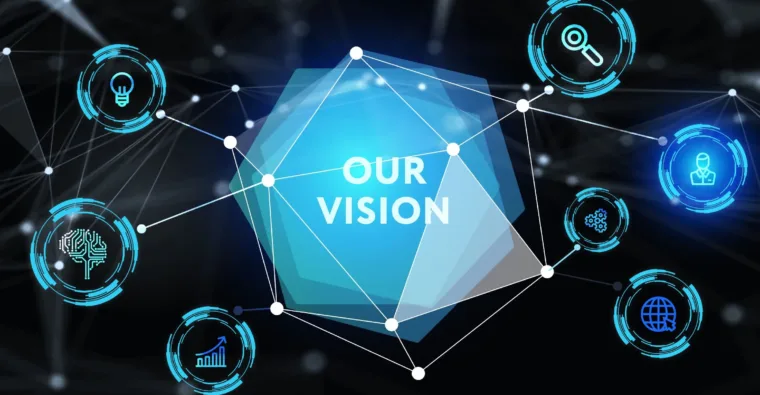The future of Gen AI in marketing presents an exciting and dynamic landscape where artificial intelligence will become an indispensable tool for creating personalized, engaging, and ethical customer experiences. As we navigate the evolving marketing ecosystem, businesses that embrace and adapt to Gen AI will be well-positioned to thrive in an era of technological innovation and customer-centric strategies. The vision for 2030 showcases a marketing landscape where Gen AI is not just a trend but an integral part of shaping the future of consumer engagement.
The Gen AI in marketing paints a picture of a highly dynamic and technologically advanced landscape. Successful marketers will harness AI’s power to create personalized, ethical, and sustainable experiences for their audiences. As Gen AI continues to evolve, marketers must remain agile, adapting strategies to leverage emerging technologies while prioritizing ethical considerations and consumer trust. The future of marketing lies at the intersection of human creativity and artificial intelligence, where brands can forge meaningful connections with consumers in innovative and responsible ways.
As we approach 2030, the marketing landscape is transforming with Generation AI (Gen AI) integration. Gen AI represents a generation of technologies and strategies powered by artificial intelligence that are set to revolutionize the way businesses connect with consumers. According to the “Global Artificial Intelligence Study” published by the international consulting firm PwC, the AI sector could contribute up to $15.7 trillion to the global economy by 2030. Marketing teams can use AI-powered tools to identify patterns, forecast behavior, and personalize marketing campaigns to target specific audiences.
In this vision for 2030, we explore the potential impact of Gen AI on marketing, highlighting key trends and advancements that will shape the industry.
Hyper-Personalization:
Gen AI will take personalization to unprecedented levels. Marketers will leverage advanced AI algorithms to analyze vast amounts of data, allowing them to create highly tailored and personalized experiences for individual consumers. From personalized content recommendations to dynamic pricing strategies, hyper-personalization will be a cornerstone of marketing efforts, enhancing customer engagement and satisfaction.
AI-Driven Content Creation:
Content creation will be revolutionized by AI, with machines capable of generating high-quality and contextually relevant content. Marketers will harness AI-powered tools to streamline the content creation process, ensuring a constant flow of engaging material across various platforms. This will enable brands to maintain a consistent and compelling presence in an increasingly competitive digital landscape.
Emails Optimization:
AI can improve email marketing in several ways. Firstly, AI can enhance the effectiveness of email campaigns by creating more engaging subject lines and tailoring the content to suit individual recipients. Additionally, AI tools can use past data to reorganize email campaigns for better results.
Furthermore, AI can determine the best times to send emails to each recipient by analyzing when they typically open their emails and then sending them accordingly. AI can also help manage contact lists more efficiently, ensuring that companies reach out to the most relevant customers.
Chatbot Evolution:
Chatbots will evolve into sophisticated conversational agents, providing real-time, intelligent customer interactions. Gen AI-powered chatbots will handle routine queries and engage in meaningful conversations, understanding context, emotions, and nuances. This level of conversational AI will enhance customer service, drive sales, and build stronger relationships between brands and consumers.
Predictive Analytics:
Marketers will increasingly rely on Gen AI for predictive analytics, allowing them to anticipate consumer behavior and market trends. Advanced machine learning models will analyze historical data, identify patterns, and accurately predict future trends. This foresight will empower marketers to proactively adjust strategies, optimize campaigns, and stay ahead of the competition.
Virtual and Augmented Reality Experiences:
Gen AI will play a pivotal role in enhancing virtual and augmented reality experiences for consumers. Marketers will leverage AI to create immersive and personalized brand experiences, blurring the lines between physical and digital worlds. From virtual try-on experiences to augmented reality product demonstrations, brands will use AI-driven technologies to create memorable and interactive encounters.
Ethical AI and Trust:
With the increasing influence of AI in marketing, there will be a growing emphasis on ethical AI practices. Brands will prioritize transparency, fairness, and accountability in their AI-driven initiatives, fostering consumer trust. The responsible use of AI in marketing will be a key differentiator, and companies that prioritize ethical considerations will build stronger, long-lasting relationships with their customer base.
Voice Search Optimization:
Voice-activated devices and virtual assistants will continue to gain prominence in consumers’ daily lives. Gen AI will enable marketers to optimize their strategies for voice search, understanding, and responding to natural language queries. Brands will focus on creating content that is voice-search friendly, ensuring their products and services remain discoverable in the expanding world of voice-enabled devices.
Blockchain for Enhanced Security and Transparency:
In the Gen AI era, blockchain technology will play a crucial role in marketing, providing enhanced security and transparency. Smart contracts powered by blockchain will be used to ensure transparent and fraud-resistant transactions, particularly in e-commerce. This technology will help build trust by securing customer data and verifying the authenticity of products, fostering a more secure and reliable marketing ecosystem.
Influencer AI Partnerships:
The collaboration between influencers and AI technologies will become more prevalent in 2030. Influencers will leverage AI tools to analyze audience preferences, optimize content strategies, and measure the impact of their campaigns. Brands, in turn, will use AI to identify the most suitable influencers for their target audience, leading to more authentic and effective influencer marketing campaigns.
Sustainable and Purpose-Driven Marketing:
Gen AI will contribute to the rise of sustainable and purpose-driven marketing practices. AI algorithms will analyze consumer sentiment and identify socially responsible trends. Brands will align their marketing efforts with environmental and social causes, reflecting a commitment to sustainability. This approach will appeal to conscious consumers and contribute to building a positive brand image.
Continuous Learning and Adaptation:
Marketers will embrace a culture of continuous learning and adaptation as AI algorithms evolve. Gen AI systems will continuously learn from real-time data, enabling marketers to adjust their strategies promptly. This adaptive approach will be crucial in a fast-paced digital environment, ensuring that marketing efforts remain relevant and effective in changing consumer behaviors and market dynamics.
Data Privacy and Regulation:
As AI-driven marketing becomes more prevalent, there will be increased scrutiny and regulation regarding data privacy. Governments and regulatory bodies will establish and enforce stricter guidelines for collecting, storing, and using consumer data. Marketers must prioritize compliance with these regulations, implementing robust data protection measures and transparent practices to build and maintain consumer trust.
It also emphasizes the importance of developing AI responsibly and ethically to harness its potential
Where is AI heading?
AI, or artificial intelligence, is rapidly advancing and has the potential to greatly impact various industries and sectors. Its ability to analyze large amounts of data and recognize patterns makes it a powerful tool in fields such as healthcare and finance. This article explores five cutting-edge applications of AI that are currently being developed. It also emphasizes the importance of developing AI in a responsible and ethical manner in order to harness its potential for creating positive change in the world.
Five AI use cases on the horizon
The field of AI is progressing at such a rapid pace that numerous experts are reluctant to predict potential future uses, as virtually anything could be possible. However, certain applications are currently in early or testing stages of development and may soon become more widely adopted. These applications include:
Self-driving labs: The integration of robotics and AI into scientific research could streamline repetitive tasks, conduct literature reviews, propose new research topics, and even autonomously carry out research with minimal human oversight, potentially accelerating the speed of new discoveries.
Highly effective decision-support algorithms: AI can help humans make complex decisions by examining numerous options and narrowing them down based on specific criteria, balancing the need for thorough consideration with the human limitation of effectively choosing between many options.
Pharmaceutical discovery: AI could speed up the process of discovering new drugs, potentially leading to personalized medicine and addressing conditions that currently receive minimal research funding.
Personalized education: AI can provide individualized tutoring and adapt to a student’s learning style, offering more effective instruction tailored to each student.
Autonomous creation and design: AI could be used to generate new designs for existing products and propose entirely new solutions, potentially disrupting traditional approaches to innovation.
People and AI: Creating a Stronger Workforce
Gen AI, or artificial intelligence generated by a new generation, can be a valuable tool for empowering employees, even for those who may initially see it as a threat.
Enhancing Employee Experience: Gen AI applications can improve how employees work by offering unexpected assistance, like suggesting new code for financial systems or drafting marketing campaign versions. They also speed up skill development; for instance, software engineers using Gen AI completed tasks twice as fast, reporting higher satisfaction.
Empowering Middle Managers: Middle managers benefit from Gen AI by facilitating employees’ adaptation to Gen AI-enabled work and overseeing new work streams. This technology also frees up time for middle managers to focus on strategic tasks and leadership, enhancing their effectiveness.
Reinventing Talent Management Practices: Gen AI allows organizations to refine talent management, including attracting diverse talent, personalized outreach, matching new hires with mentors, and streamlining administrative tasks, thereby improving the overall talent development process.
Transforming Senior Leadership: Senior leaders must advocate for and implement Gen AI while preparing for future advancements. They should foster collaboration between technology and business units, communicate the business objectives of Gen AI clearly, and invest in ongoing education about AI advancements to lead their teams effectively. Additionally, they should continually assess the organization’s readiness for future iterations of Gen AI.








